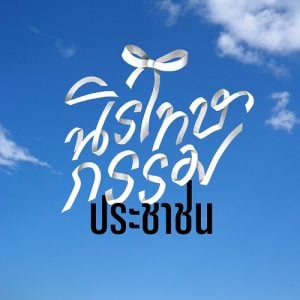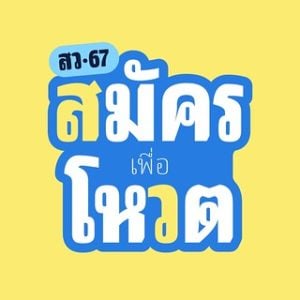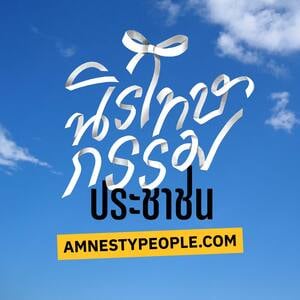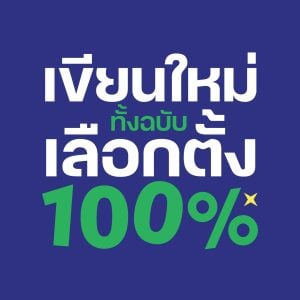“The matter of the law came up before the performance. We talked about it together backstage before we went on, too. We thought it was similar to the folkloric dramas shown in the morning on television. These dramas also contain stories of the lords. We thought that there was no chance that prosecutions would arise from the performance of a play. That would be absurd.”
Golf Pornthip and Bank Patiwat were arrested under Article 112 for directing and performing in “The Wolf Bride.” They were denied the right to bail during the period of investigation and examination of the case. On 23 February 2015, they were sentenced to 5 years in prison; the sentences of both were reduced by half to 2.5 years since they confessed.
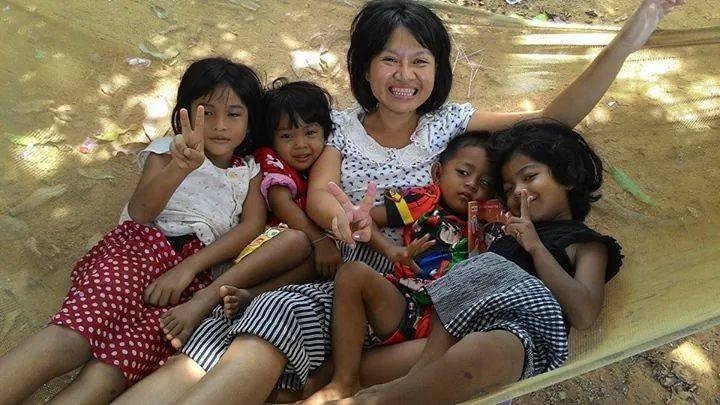
One member of the theater group gave an account of the play and their arrests:
“The play came into being when we joined the project for the 40th anniversary of 14 October [*]. We wrote a proposal with the goal of developing and expanding the capacity of performance. There are few people who work in theater. So the Prakai Fai Theater Group created a project to invite young people and activists from many different groups to come together to do activities and communicate with society via plays. Prakai Fai acted as the coordinating body and people ages 10-40 joined together to do workshops and think collectively about the play and what we wanted to communicate through it.”
“Golf came up with the name ‘The Wolf Bride.’ She thought it up very quickly because the 14 October Foundation wanted to use it for public relations. But afterwards, many people worked together to write the play. The content was transformed entirely from Golf’s initial ideas.”
“Our intention was to communicate ideas about class. At that time, the issue of the color of one’s shirt was pressing [**]. At the end of the play, children came onto the stage fighting over a pillow. Chicken feathers scattered everywhere. This was a symbol of the colors splattering everywhere and ending in killing, which is not a solution. We wanted to go to the structure of the problem.”
“The performers were not paid. No one who worked on the play was paid for doing so. We asked for funding to make the props and sets. We nearly did not have enough money to go buy the various items.”
Then the team that created the play explained the origins of the performance that led to two of their friends being imprisoned. Many others are in hiding because they are uncertain about whether or not warrants will be issued for their arrests. They are also uncertain about if and when soldiers and police will enter and search their houses, given that martial law is in place.
“Prakai Fai Theater Group came together in 2009. Our primary activity was to teach theater to children in the provinces. Golf’s dream was for children in the provinces to be able to use plays and art to tell stories about what happened in their lives. She wanted children to have ways of communicating that were different from straightforward accounts or holding up a sign. These methods have been used for many years without success.”
“Golf was always working with children. For example, whenever there was any sort of event in Bangkok, she invited the children she had taught to come and tell stories, or come up on stage and join in various events.”
“After the dispersal of protests in 2010, we performed street theater about people who had lost their lives [***]. At first, we performed the plays without any money. We made our own costumes or wore donated ones. We asked for donations of discarded make-up. Then, when people began to be interested, we created a donation box and used the money to make props. Performers never personally took money from the donation box, because we saved it to create the next play.
One member of the “Prakai Fai Theater Group” told a story about a small activist group that worked independently and from a place of love. A story about a small activist group that had to dissolve and the members went their separate ways due to the political situation and to remain safe.
“Golf could be irritable while we were working, but was also kind to her friends and younger people. She possesses a great deal of discipline, which makes her friends respect her. She is creative and can direct others. She has a power in giving orders such that a given set must be a certain way. But it is not as though we cannot disagree. She listens.”
“Golf went to high school and became an activist in Phitsanulok. Her activism continued when she came to study at Ramkhamhaeng University. Before she was active politically, she did activities about youth development. Golf liked to go teach children in impoverished villages in the provinces, such as Mukdahan, the three southern provinces, and Khlong Toey. She liked to teach children who did have the opportunity for extracurricular study. She taught them how to draw and how to speak English. Sometimes she joined existing networks and sometimes she created new areas. But Golf came into the fore working on politics.”
“Golf likes to draw a lot and has artistic gifts. When she was in secondary school, she won a watercolor competition. Golf’s dream is to be an art teacher for children who live on the mountain. Her dream is to open a school for children in which their natural environment will be the basis of learning. She will teach them without compelling them to believe in religion. But her mother does not agree with the dream, because she thinks that if she becomes a teacher, she may be impoverished.”
“After she did the play with the 14 October Foundation, Golf met many people including children. Golf’s dreams are beautiful and she believes that children can change the world.”
An activist friend who has known Golf for many years talked about Golf’s way of being, and about her beautiful dream that will not have an opportunity to come to fruition for at least another 2 years and 6 months:
Although a small, determined person may not be able to be free within a restricted political atmosphere …
Although a small theater group, a group of which there is a memory, may not continue to exist under conditions of severe repression …
But a small dream, a dream with this smile behind it, may not be diminished by martial law, being locked up, or the judicial process.
For more details of the case, visit our database.
Notes:
[*] After several weeks of protests, a mass movement of students and people culminated in the ouster of the three then-ruling dictators on 14 October 1973. The movement inaugurated a period of open, more democratic politics which lasted until the 6 October 1976 massacre and coup inaugurated a return to dictatorship. [**] Politics in Thailand became color-coded, and increasingly contentious, beginning in the months prior to the 19 September 2006 coup which ouster former prime minister Thaksin Shinawatra. The royalist-nationalists who opposed Thaksin took up the color yellow as a unifying symbol. In opposition, supporters of Thaksin, those who opposed the coup, and others who were populists, democrats, or both, took up the color red as a unifying symbol. [***] Red shirt protestors engaged in extended street protests in Bangkok calling for elections and an end to double standards in politics beginning in March 2010. The protests were ended with a series of military crackdowns in April and May 2010. At least 94 people were killed and over 2000 injured, the vast majority of whom were civilians.

